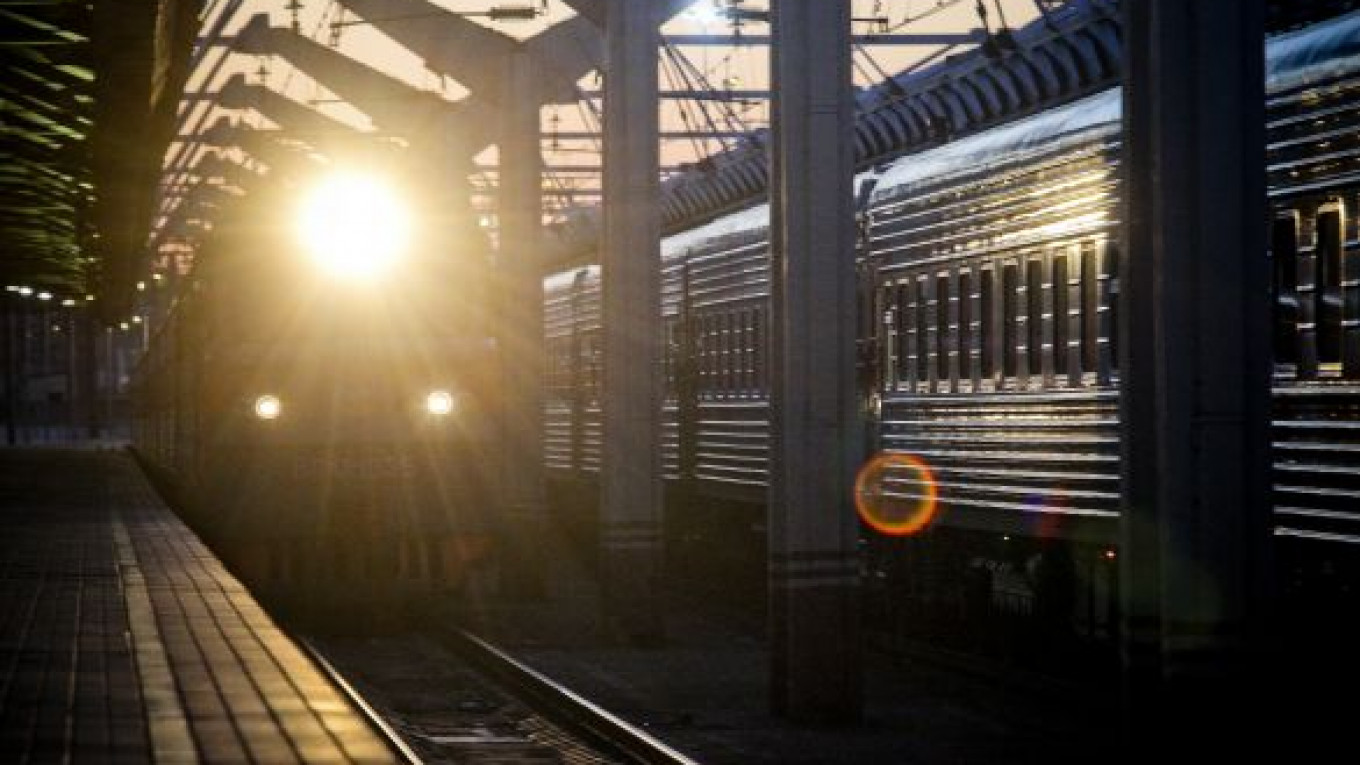The romantic role of train travel in Russian culture is slowly being unseated by cramped airplanes as flight tickets become more affordable and government subsidies for economy-class rail tickets are trimmed, according to a report from Metropol consultancy.
"The Russian aviation industry has already surpassed Russian Railways," said Andrei Rozhkov, senior transportation analyst at Metropol. "The trends are clear, and we can see already that these trends will remain in effect for the future."
The research, which is slated to be released next week, was done at the behest of investment funds interested in buying shares in national carrier Aeroflot and No.2 airline Transaero.
Traffic on both trains and airlines is seeing double-digit growth, but rail travel is losing market share. One of the key issues is that some train tickets are increasing in price faster than the cost of traveling the same route by air.
The average ticket price on Aeroflot rose 7 percent in the first nine months of 2011, while average train ticket prices rose 10 percent, according to Metropol's study. Train prices are expected to increase even more in the future following the government's announcement that it will drastically cut subsidies for Russian Railways.
State subsidies for rail travel have been cut in half, from 30 billion rubles ($966 million) in 2012 to 15 billion rubles in 2013. Meanwhile, the Transportation Ministry said this week that it plans to give 750 million rubles in subsidies to Russian airlines to keep regional ticket prices down. This measure could cut prices on some domestic routes up to 50 percent.
Passengers traveling by third-class platzkart rail will be hit the hardest by the reduced subsidies. The Federal Passenger Co., a Russian Railways subsidiary for long-haul passenger routes, estimated that price liberalization for the cheapest train tickets would result in a 67 percent cost increase.
Just getting these tickets could be challenging, since the company has no plans to increase the number of platzkart train cars despite high demand. The quantity of such cars has not increased since 2011, Mikhail Akulov, general director of the Federal Passenger Co. and vice president of Russian Railways, said Thursday.
The practice of financing lower-class travel through revenues from higher-priced tickets must stop, Akulov said.
"Starting next year, we won't have the opportunity to continue this cross-subsidization within the company," he said. "We are spending money that we skillfully earn through the expensive segment not to develop that segment but to fulfill obligations that are set by the state."
The liberalization of train ticket prices will result in more passengers choosing to travel by air, Rozhkov said. The shift will be felt most in shorter flights, since medium-distance and long-haul travel will still be cheaper on trains — though less so than in the past.
Metropol estimated that train fares for journeys less than 1,000 kilometers would rise to 127 percent of Aeroflot's price for an analogous ticket. Medium- and long-distance fares are expected to increase to 40 and 28 percent, respectively, of prices for a comparable Aeroflot ticket.
The Federal Passenger Co. has projects in the pipeline to make rail travel more attractive. The company plans to debut 50 double-decker train cars in 2013, shorten travel times on several routes, expand the Wi-Fi network on its trains and roll out more customer-loyalty and discount programs.
But Rozhkov said these measures are unlikely to shift travelers' preferences.
"The key factors are cost and time of travel, not access to Wi-Fi," Rozhkov said.
At the same time, trains would have the advantage against regional airlines in terms of departure frequency. Russian Railways may offer multiple travel-time options, while regional airlines could be limited to one flight per week.
Russia has a lot of room to grow in terms of air travel, Rozhkov said. The country's air mobility index, which is used to estimate the annual number of flights per inhabitants, was 0.45 in 2011, while in developing countries the index ranges from 1.5 to 2.5.
The Russian government forecasts that the air mobility index will increase to between 0.69 and 0.88 by 2020.
Related articles:
A Message from The Moscow Times:
Dear readers,
We are facing unprecedented challenges. Russia's Prosecutor General's Office has designated The Moscow Times as an "undesirable" organization, criminalizing our work and putting our staff at risk of prosecution. This follows our earlier unjust labeling as a "foreign agent."
These actions are direct attempts to silence independent journalism in Russia. The authorities claim our work "discredits the decisions of the Russian leadership." We see things differently: we strive to provide accurate, unbiased reporting on Russia.
We, the journalists of The Moscow Times, refuse to be silenced. But to continue our work, we need your help.
Your support, no matter how small, makes a world of difference. If you can, please support us monthly starting from just $2. It's quick to set up, and every contribution makes a significant impact.
By supporting The Moscow Times, you're defending open, independent journalism in the face of repression. Thank you for standing with us.
Remind me later.






